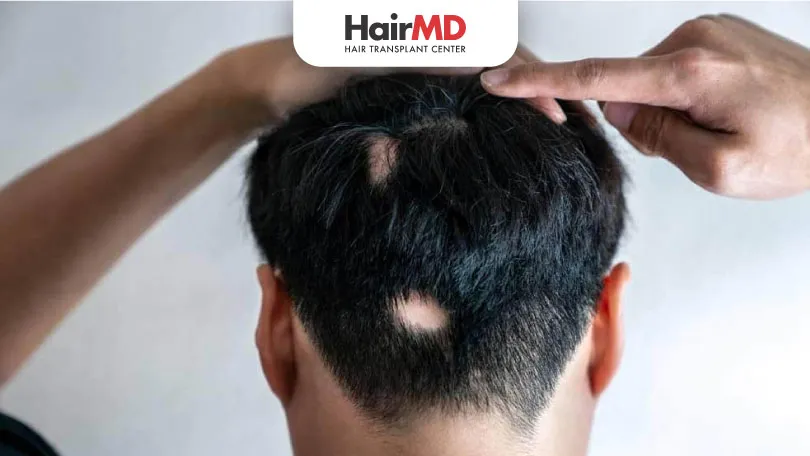20th May, 2024

Earlier, in most cases, hair problems used to begin after the 40s. But considering the stressful lifestyle today’s people live, hair problems like hair fall, hair loss, etc., can now start as early as the mid-late 20s or early 30s
Alopecia areata, which is a common hair loss condition, is something that people can confront at any age. But at what age does alopecia areata start, and how long does it take for alopecia to develop? Let’s answer these questions while exploring a few other aspects of this condition in this blog.
What’s covered in the article?
- What is Alopecia Areata?
- Who is at a Risk of Alopecia Areata?
- At what Age Does Alopecia Areata Begin?
- How Long Does It Take for Alopecia to Develop?
- Can Alopecia Areata be Cured?
- Choose HairMD for Alopecia Treatment in Pune
- Conclusion
What is Alopecia Areata?
Alopecia areata occurs when the immune system attacks hair follicles and causes hair loss. Alopecia areata can make an individual lose hair from any part of the body. But it primarily affects the head and face. Usually, hair falls out in small, round patches, which are about a quarter in size. However, in some cases, the hair loss could be extensive.
Who is at a Risk of Alopecia Areata?
Practically, any person could be at risk of alopecia areata. The condition affects both men and women, although women are at a slightly higher risk than men. In many cases, alopecia areata is hereditary. Scientists have related various genes to the disease, suggesting the significant role that genetics play in alopecia areata. Many genes that the studies have found are crucial to immune system functioning.
People with autoimmune diseases like vitiligo, thyroid, psoriasis, etc., are at a higher risk of developing alopecia areata. In addition, people with allergic conditions like hay fever also can develop the condition.
At what Age Does Alopecia Areata Begin?
Alopecia areata’s onset could be at any age. But most who suffer from this condition develop it in their teens, twenties, or thirties. Alopecia areata in children under ten years of age could be much more extensive and proliferative.
How Long Does It Take for Alopecia to Develop?
The time required for the condition’s onset and progression may vary from person to person. In some cases, old or more bald patches develop a few weeks after the first one. In some instances, when the first patch regrows hair, there is a second patch growing next to it. It may look as if small bald patches rotate around various parts of the scalp.
Can Alopecia Areata be Cured?
Alopecia areata cannot be cured. But a proper dermatologist treatment can help regrow hair. In some people, regrowth wouldn’t even require treatment. The hair will regrow naturally after a particular period. In some cases, alopecia areata will occur, causing hair loss and growth cycles. If the hair isn’t regrowing naturally in your case, you may seek a dermatologist’s help.
Choose HairMD for Alopecia Treatment in Pune
At HairMD, our dermatologists will diagnose your alopecia areata condition and prescribe treatment to help you regrow your hair. We provide a range of non-invasive treatments like injections, corticosteroids, and OTC drugs. In addition, we offer natural treatment options like aromatherapy, acupuncture, massaging, diet plan, etc. Visit to book an appointment.
Do You Know?
Nearly 250 Patients Visit HairMD
Everyday For Various Hair Concerns?
(Your journey to healthier and fuller hair starts here!)
Meet Our Dermatologists
Conclusion
In conclusion, alopecia areata can begin at any age, but it most commonly manifests during the teenage years to the early thirties. While it can affect both genders, women may be at a slightly higher risk. The exact onset and progression can vary significantly among individuals. Although there is currently no cure, various treatments are available to help manage the condition and promote hair regrowth. For personalized treatment options, consulting a dermatologist is advisable.
Further Reading
Top Kitchen Ingredients to Boost Hair Growth
Discover the best kitchen ingredients for hair growth! Use coconut oil, onion juice, aloe vera & more to nourish your hair naturally and reduce hair fall.
How to use Minoxidil and Dermaroller together?
Boost hair growth with Minoxidil & Dermaroller! Learn the right technique, benefits, and mistakes to avoid for thicker, healthier hair.
Powerful Home Remedies for Itchy Scalp
Soothe an itchy scalp naturally with home remedies like aloe vera, coconut oil, and apple cider vinegar. Discover simple solutions for scalp relief.
Omega-3 for Hair Growth: Benefits and Side Effects
Omega-3 nourishes hair, promotes growth, and reduces hair fall. Know its benefits, side effects, and best sources for healthy, stronger hair.
Have thoughts? Please let us know
We are committed not only to treating you, but also educating you.











